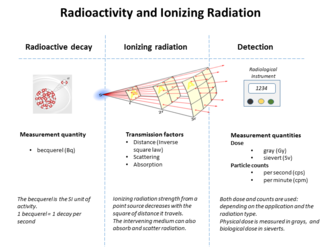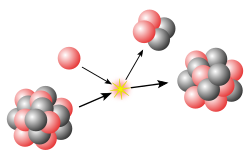Particle radiation
Particle Radiation[edit]

Particle radiation is a form of ionizing radiation that consists of subatomic particles. These particles have sufficient energy to ionize atoms or molecules by detaching electrons from them. Particle radiation is a key concept in nuclear physics, radiation therapy, and radiation protection.
Types of Particle Radiation[edit]
Particle radiation can be classified into several types based on the particles involved:
- Alpha particles: These are helium nuclei, consisting of two protons and two neutrons. Alpha particles are emitted during the radioactive decay of heavy elements such as uranium and radium. They have a relatively low penetration depth and can be stopped by a sheet of paper or human skin.
- Beta particles: These are high-energy, high-speed electrons or positrons emitted by certain types of radioactive nuclei such as potassium-40. Beta particles are more penetrating than alpha particles but can be stopped by a few millimeters of aluminum.
- Neutrons: Neutron radiation consists of free neutrons, which are neutral particles. Neutrons are released during nuclear fission and fusion reactions. They are highly penetrating and can be stopped by materials rich in hydrogen, such as water or concrete.
- Protons: Proton radiation consists of positively charged particles. Protons are used in proton therapy for cancer treatment due to their ability to deliver precise doses of radiation to tumors.
Sources of Particle Radiation[edit]
Particle radiation can originate from both natural and artificial sources:
- Natural sources: These include cosmic rays from outer space and radioactive decay of elements in the Earth's crust.
- Artificial sources: These include nuclear reactors, particle accelerators, and medical applications such as radiation therapy.
Applications of Particle Radiation[edit]
Particle radiation has several important applications:
- Medical imaging and therapy: Techniques such as PET scans and radiation therapy use particle radiation to diagnose and treat diseases.
- Nuclear power: Particle radiation is a byproduct of nuclear reactions used to generate electricity.
- Scientific research: Particle accelerators use particle radiation to study the fundamental properties of matter.
Health Effects[edit]
Exposure to particle radiation can have significant health effects. High doses can cause radiation sickness, while long-term exposure increases the risk of cancer. Protective measures, such as shielding and limiting exposure time, are essential to minimize these risks.
Related Pages[edit]
| Nuclear physics |
|---|
|
|
| Radiation (physics and health) | ||||||||
|---|---|---|---|---|---|---|---|---|
|
Ad. Transform your life with W8MD's Budget GLP-1 injections from $49.99


W8MD offers a medical weight loss program to lose weight in Philadelphia. Our physician-supervised medical weight loss provides:
- Weight loss injections in NYC (generic and brand names):
- Zepbound / Mounjaro, Wegovy / Ozempic, Saxenda
- Most insurances accepted or discounted self-pay rates. We will obtain insurance prior authorizations if needed.
- Generic GLP1 weight loss injections from $49.99 for the starting dose of Semaglutide and $65.00 for Tirzepatide.
- Also offer prescription weight loss medications including Phentermine, Qsymia, Diethylpropion, Contrave etc.
NYC weight loss doctor appointmentsNYC weight loss doctor appointments
Start your NYC weight loss journey today at our NYC medical weight loss and Philadelphia medical weight loss clinics.
- Call 718-946-5500 to lose weight in NYC or for medical weight loss in Philadelphia 215-676-2334.
- Tags:NYC medical weight loss, Philadelphia lose weight Zepbound NYC, Budget GLP1 weight loss injections, Wegovy Philadelphia, Wegovy NYC, Philadelphia medical weight loss, Brookly weight loss and Wegovy NYC
|
WikiMD's Wellness Encyclopedia |
| Let Food Be Thy Medicine Medicine Thy Food - Hippocrates |
Medical Disclaimer: WikiMD is not a substitute for professional medical advice. The information on WikiMD is provided as an information resource only, may be incorrect, outdated or misleading, and is not to be used or relied on for any diagnostic or treatment purposes. Please consult your health care provider before making any healthcare decisions or for guidance about a specific medical condition. WikiMD expressly disclaims responsibility, and shall have no liability, for any damages, loss, injury, or liability whatsoever suffered as a result of your reliance on the information contained in this site. By visiting this site you agree to the foregoing terms and conditions, which may from time to time be changed or supplemented by WikiMD. If you do not agree to the foregoing terms and conditions, you should not enter or use this site. See full disclaimer.
Credits:Most images are courtesy of Wikimedia commons, and templates, categories Wikipedia, licensed under CC BY SA or similar.
Translate this page: - East Asian
中文,
日本,
한국어,
South Asian
हिन्दी,
தமிழ்,
తెలుగు,
Urdu,
ಕನ್ನಡ,
Southeast Asian
Indonesian,
Vietnamese,
Thai,
မြန်မာဘာသာ,
বাংলা
European
español,
Deutsch,
français,
Greek,
português do Brasil,
polski,
română,
русский,
Nederlands,
norsk,
svenska,
suomi,
Italian
Middle Eastern & African
عربى,
Turkish,
Persian,
Hebrew,
Afrikaans,
isiZulu,
Kiswahili,
Other
Bulgarian,
Hungarian,
Czech,
Swedish,
മലയാളം,
मराठी,
ਪੰਜਾਬੀ,
ગુજરાતી,
Portuguese,
Ukrainian
